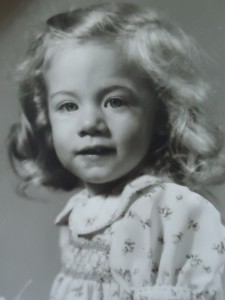First Years … First Memories
Lea Wait, here. I’ve been working on the third book in my Mainely Needlepoint series. If you haven’t read the first one, Twisted Threads, published earlier this month: Angie Curtis, the main character, is from Haven Harbor, Maine. Her mother disappeared when she was ten years old. Angie left Maine when she was eighteen, but now she’s back, to find her mother’s killer and start a new life.

Lea at age 2 1/2
As Angie visits places she hasn’t seen since her childhood, and meets people she knew as a little girl, her memories haunt her. Good memories and not-so-good memories. When I’m writing from her point of view, memories are on my mind.
So when I saw an article in This Week magazine called “Why We Forget Our First Years” I read it.
Some of us have memories of our early childhoods. But this article said that most adults do not remember their first three or four years, and have very few memories of what happened before they were about 7. Would returning to a home where they’d lived as a child or meeting a long-lost relative bring those memories back? Not according to this author. He wrote that until the 1980s, that was what was believed. But a 1987 study showed that many 2 1/-2 year-old children could describe events that had taken place 6 months before. Even many children between the ages of 4 and 10 could recall incidents that happened when they were only two years old. But interviewed again two years later, two-thirds of these same children had forgotten those incidents. Called “childhood amnesia,” the study showed that most of our childhood is forgotten. Gone. The memories we do keep are sometimes connected to emotions … sometimes totally random.
Does what happened in those early years matter, if we can’t remember them? Psychologists say yes, even if we can’t remember the details of our early life, those events imprinted on our emotions, so in later years we believe circuses are fun (or scary;) dogs are good; cats scratch. Grownups can be trusted. Or not.
I have three memories from before I was 2 1/2. I remember being outdoors, bending down to look through a cellar window, and seeing a bunny. I remember climbing a lot of stairs and finding a room at the top of the stairs on the right that was filled with cartons … and my doll’s swing, on top of the boxes, in a spot of sunlight by the far window. I remember holding my grandmother’s hand and walking through a tunnel of white snow, away from my house.
When my mother was still alive I shared those memories with her, and she agreed they were real. The bunny lived in the basement of the house next door to where we lived until I was 2 1/2. The room I remembered (and which became my own room years later) was on the third floor of the house we moved into a month before my little sister was born. And my grandmother came from Boston to New Jersey and took me back to Boston with her so my mother could unpack and rest before her next baby was born. My grandmother and I left New Jersey right after a heavy snowfall and took the train to New York, and then to Boston. I have no recollection of that train ride.
I have other memories, too … many of them of my grandparents’ house, and people and things there. They left that house to move in with us when I was nine, so the memories were of events before then, but I can’t date them.
When I’m writing Angie Curtis’ memories, I’m assuming she can remember repeated events, like Fourth of July fireworks and Christmas. And she can remember emotional events, like special days she spent with her mother.
But, of course, I’m writing fiction.
How far back do your memories go? And how often do you think of them? I’m not a psychologist, but I suspect those are important questions. And, as a writer, even if I can’t answer the questions for myself … I can answer them for my characters.
Lea Wait's Blog
- Lea Wait's profile
- 506 followers



